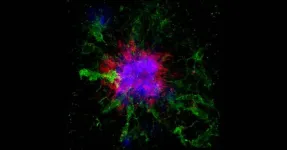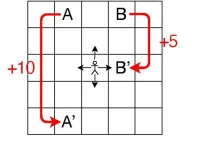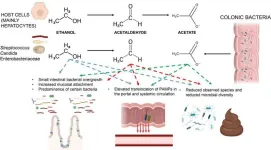Schintler & collaborators to study perceptions of efficiency & bias in algorithmic versus human peer review
2023-08-21
(Press-News.org)
Laurie Schintler, Associate Professor, Schar School of Policy and Government, is set to receive funding for the project: "Perceptions of Efficiency and Bias in Peer Review: Algorithmic versus Human Decision Making."
This project is a collaboration between the Schar School of Policy and Government (GMU) and the Department of Sociology and Anthropology (CHSS-GMU). The investigators on the team include:
PI Laurie A. Schintler;
Co-PI Connie L. McNeely, Professor, Schar School of Policy and Government; and
Co-PI James Witte, Professor, Sociology, Sociology and Anthropology; Director, Institute for Immigration Research
This project will develop improved methods and concepts to guide the development and application of artificial intelligence technologies that could be used in peer review processes for evaluating scientific publishing and funding outcomes. The research team will seek to compare perceptions of peer review decisions assisted by algorithms to those made by humans.
The focus of the research is on the ethics and value of using algorithms in peer review. On the one hand, algorithmic peer review serves an instrumental purpose, purportedly offering the ability to make more efficient decisions. On the other hand, algorithms can produce biased and discriminatory decisions, which can raise ethical concerns about their use.
The research team will carry out a factorial survey based on experiments in which research participants are presented with vignettes regarding human and algorithmic peer review decision-making. The researchers will ask participants to assess the legitimacy of each scenario in light of bias and efficiency. The team will employ various techniques, principally multi-level econometric methods, to analyze data drawn from the survey and other sources.
The project will offer insights on measuring both pragmatic and moral legitimacy as they pertain to peer review. The project will also provide an adaptable survey tool and approach for gauging perceptions about algorithmic versus human peer review decisions and other scholarly communication activities.
Regarding the importance of the project, Schintler said, "This study will expand knowledge and perceptions of the benefits and downsides of using artificial intelligence in peer review and how science as a human and machine endeavor should be conducted."
Schintler will receive $399,922 from the National Science Foundation for this project. Funding will begin in Sept. 2023 and will end in late Aug. 2025.
###
About George Mason University
George Mason University is Virginia's largest public research university. Located near Washington, D.C., Mason enrolls 38,000 students from 130 countries and all 50 states. Mason has grown rapidly over the last half-century and is recognized for its innovation and entrepreneurship, remarkable diversity and commitment to accessibility. Learn more at http://www.gmu.edu.
END
ELSE PRESS RELEASES FROM THIS DATE:
2023-08-21
Nora McDonald, Assistant Professor, Information Sciences and Technology, is set to receive funding from the National Science Foundation for the project: "Collaborative Research: SaTC: CORE: Medium: Beyond App-centric Privacy: Investigating Privacy Ecosystems among Vulnerable Populations."
Prior research shows that people who have privacy concerns may be reluctant to access medical services. This is especially true for vulnerable populations, such as those who because of their gender, race, ethnicity, socio-economic status, or other marginalizations are more susceptible to privacy risk. These risks go beyond individual apps ...
2023-08-21
Paul Acosta, Postdoctoral Scholar, Atmospheric, Oceanic and Earth Sciences (AOES), and Natalie Burls, Associate Professor, AOES; Graduate Program Director, Climate Dynamics, received funding from the National Science Foundation for the project: "Collaborative Research: Using a weather model and geologic data to test tectonic mechanisms in an intercontinental setting: The Altai Mountains of Central Asia."
This project seeks to apply new advances in atmospheric and geosciences to ...
2023-08-21
Jinwei Ye, Assistant Professor, Computer Science, received funding for the project: "CAREER: Towards Polarimetric Visual Understanding."
In this project, Ye will study how the way surfaces reflect polarized light can be used to help recognize objects more effectively.
Ye will address the following two questions: (1) How does the polarization of light change after interacting with various types of surfaces? (2) What can polarized light tell us about the kinds of objects that it has interacted with?
Addressing these questions can lead to significant improvements in machine vision systems by strengthening their capability to do geometric ...
2023-08-21
One of the hallmarks of Alzheimer’s disease is disruption to the body’s circadian rhythm, the internal biological clock that regulates many of our physiological processes. Nearly 80% of people with Alzheimer’s experience these issues, including difficulty sleeping and worsening cognitive function at night. However, there are no existing treatments for Alzheimer’s that target this aspect of the disease.
A new study from researchers at University of California San Diego School ...
2023-08-21
How does a gambler maximize winnings from a row of slot machines? This is the inspiration for the "multi-armed bandit problem," a common task in reinforcement learning in which "agents" make choices to earn rewards. Recently, an international research team led by Hiroaki Shinkawa at the University of Tokyo developed an extended photonic reinforcement learning scheme that moves from the static bandit problem towards a more challenging dynamic environment. This study was published July 25 in Intelligent Computing, a Science Partner Journal.
The success of ...
2023-08-21
August 21, 2022 – Implantable penile prostheses (IPPs) are an established treatment option for erectile dysfunction (ED), and are covered by insurance in about 80% of cases, reports a paper in the September issue of Urology Practice®, an Official Journal of the American Urological Association (AUA). The journal is published in the Lippincott portfolio by Wolters Kluwer.
However, some employer-sponsored insurance plans specifically exclude this guideline-recommended treatment option for ED, according to the new research by Dr. Mohit Khera, MD, MBA, MPH, of Baylor College ...
2023-08-21
Neuroscientists at Radboudumc show that adversities permanently change the functioning of the brain. Furthermore, an aberrant reaction of the brain to adversities is related to anxiety symptoms. This may have predictive value for the development of psychiatric disorders.
Your brain is shaped by the things you experience. That sounds logical, but can you really measure that? And what can you do with it? Neuroscientists at Radboud university medical center investigated the influence of adversities in life on patterns in the brain. They found remarkable associations that may have predictive value for the development of psychiatric disorders.
Special ...
2023-08-21
EAST LANSING, Mich. – Michigan State University today named Judd Herzer as the director of MSU Mobility to help amplify and focus the university’s vast research activities in the smart-vehicle landscape. Satish Udpa, University Distinguished Professor in the College of Engineering at MSU and co-founder of MSU Mobility, has been fulfilling the duties of this newly created role in an interim capacity while the university looked for the ideal candidate.
Mobility is among MSU’s principal areas of research and innovation, and MSU Mobility and its ...
2023-08-21
Harbir Antil, Director, Center for Mathematics and Artificial Intelligence, and Professor, Mathematical Sciences, received funding for: "Mathematics for Digital Twins (MATH-DT)."
This award will provide support for a workshop titled "Mathematical Opportunities in Digital Twins" to be held on Dec. 11-13, 2023, at George Mason University's campus in Arlington, VA.
The workshop will bring together key experts working in many aspects of mathematics, key application fields, and industry with the goal of determining ...
2023-08-21
Alcohol consumption is a significant risk factor for gastrointestinal diseases, including cancer. Alcohol can damage the gastrointestinal tract in several ways. It can promote an impairment of several intestinal barrier functions, leading to leaky gut and dysbiosis. Ethanol metabolism can also produce toxic substances such as acetaldehyde and acetate, further damaging the gut and potentially promoting cancer. Ethanol and its metabolites enhance DNA damage response and dysregulate the epithelial proliferation/differentiation program, thereby increasing the risk of cancer development.
In a new paper published in eGastroenterology, ...
LAST 30 PRESS RELEASES:
[Press-News.org] Schintler & collaborators to study perceptions of efficiency & bias in algorithmic versus human peer review


